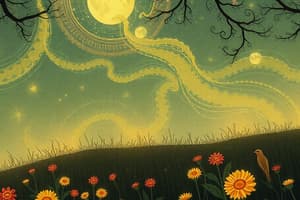Podcast
Questions and Answers
What form of poetry did Walt Whitman innovate?
What form of poetry did Walt Whitman innovate?
- Limerick
- Haiku
- Free verse (correct)
- Sonnet
Which poet was a pioneer of jazz poetry?
Which poet was a pioneer of jazz poetry?
- Langston Hughes (correct)
- Walt Whitman
- T.S. Eliot
- William Shakespeare
What is essential to fully appreciate poetry?
What is essential to fully appreciate poetry?
- Rhyme scheme only
- Genre classification
- Historical background only
- Interpreting word choice and rhythm (correct)
Which poet is considered one of the greatest in the history of the English-speaking world?
Which poet is considered one of the greatest in the history of the English-speaking world?
Poetry allows poets to convey their thoughts and feelings with great intensity and emotion due to its ________.
Poetry allows poets to convey their thoughts and feelings with great intensity and emotion due to its ________.
What theme is NOT commonly explored in poetry?
What theme is NOT commonly explored in poetry?
What is a Villanelle?
What is a Villanelle?
Which poetic form offers complete freedom in expression?
Which poetic form offers complete freedom in expression?
What is the defining feature of a Haiku?
What is the defining feature of a Haiku?
What was the initial purpose of poetry in ancient societies?
What was the initial purpose of poetry in ancient societies?
Which poetic form is often divided into an octave and a sestet?
Which poetic form is often divided into an octave and a sestet?
What distinguishes ancient poetry from modern free verse?
What distinguishes ancient poetry from modern free verse?
Study Notes
Expanding Your Horizons: A Journey Through the World of Literature, Beginning with Poetry
Embarking on the Poetic Adventure
Poetry, a captivating form of literature, has been shaping human civilization for thousands of years. From ancient epics to modern free verse, poetry is an art that condenses thought, emotion, and imagination into a concise and entrancing form. As we embark on our journey through the world of literature, we'll start by diving into the depths of poetry.
Origins and Evolution
Poetry originated as an oral tradition, with poets reciting verses to share stories, history, and wisdom. In ancient societies, it was a means of entertainment, education, and preserving cultural memory. Over time, poetry evolved into various forms, reflecting cultural and historical developments.
Forms and Techniques
Poetry incorporates an array of forms and techniques, such as sonnets, haiku, villanelles, and free verse.
- Sonnet: A 14-line poem, often divided into an octave and a sestet, following a specific rhyme scheme and metrical pattern.
- Haiku: A three-line poem, with a 5-7-5 syllable count, written in a minimalist style to capture a single moment or image.
- Villanelle: A 19-line poem, with a specific rhyme scheme and repeated refrain, creating a hypnotic effect.
- Free verse: A form that doesn't adhere to any specific rhyme scheme or metrical pattern, offering poets complete freedom in their expression.
Influential Poets
Throughout history, poets have influenced literature and society with their creativity and innovation. A few celebrated names include:
- William Shakespeare: A master of the English language, who is considered one of the greatest poets and playwrights in the history of the English-speaking world.
- Walt Whitman: An American poet known for innovating free verse and capturing the spirit of democracy in his work.
- T.S. Eliot: A renowned English poet and playwright, who expanded the boundaries of poetry and drama.
- Langston Hughes: A prominent African American poet, who was an important voice in the Harlem Renaissance and a pioneer of jazz poetry.
Themes and Ideas
Poetry explores a wide range of themes and ideas, including love, nature, war, religion, and social issues. The uniquely compact and poetic form allows poets to convey their thoughts and feelings with great intensity and emotion.
The Art of Reading Poetry
To fully appreciate poetry, it's essential to develop the skills of reading and interpreting it. We must engage with the text, considering the poet's word choice, rhythm, and sound, as well as the context and historical background.
Final Thoughts
Poetry is an art form that enriches our lives, challenging us to think deeply and feel intensely. Whether you're a seasoned poet or just discovering poetry for the first time, there's a world of beauty, insight, and emotion waiting for you to explore. So, don't hesitate, dive in, and let yourself be transported to the wonders of poetry.
Studying That Suits You
Use AI to generate personalized quizzes and flashcards to suit your learning preferences.
Description
Embark on a poetic adventure through the captivating world of literature, where poetry serves as a condensed form of thought, emotion, and imagination. Learn about the origins, evolution, forms, techniques, influential poets, themes, and reading strategies of poetry.




